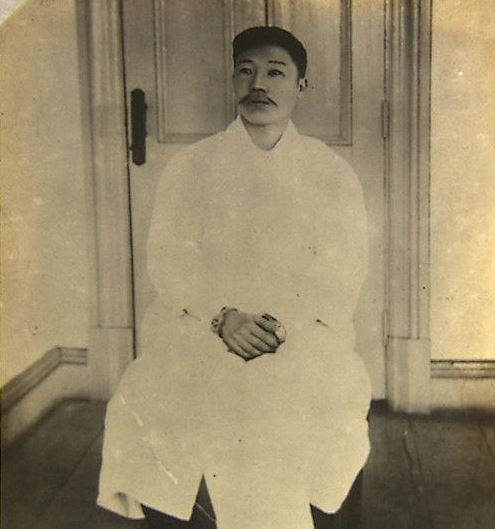Two Koreas may step up bid to recover remains of hero Ahn Jung-geun in China
By YonhapPublished : Jan. 22, 2019 - 11:39
South Korea will redouble its effort to recover the remains of Ahn Jung-geun, the revered independence fighter who assassinated a top Japanese colonial official in China 110 years ago, government officials said Tuesday.
Ahn -- who shot the Korean Peninsula's first Japanese governor-general, Hirobumi Ito, at a railway station in Harbin, the capital of China's northeastern province of Heilongjiang, in 1909 -- is respected as a national hero.
Ahn was executed at a Japanese prison in the northern Chinese district of Ryojun, now called Lushun, in Dalian on March 26, 1910, and presumably buried in the vicinity of the prison.
Ahn -- who shot the Korean Peninsula's first Japanese governor-general, Hirobumi Ito, at a railway station in Harbin, the capital of China's northeastern province of Heilongjiang, in 1909 -- is respected as a national hero.
Ahn was executed at a Japanese prison in the northern Chinese district of Ryojun, now called Lushun, in Dalian on March 26, 1910, and presumably buried in the vicinity of the prison.

Prior to his execution, Ahn left a will to his two brothers saying, "I wish my bones will be buried near the Harbin Park after I die and then will be re-entombed in my native country after Korea recovers its sovereignty. I will also make every effort for the independence of Korea even after I go to heaven."
At that time, Ahn's family demanded his remains be returned to Korea but Japan refused and kept his burial site a secret.
Historians say Japan's refusal to hand over Ahn's remains to his family was illegal and highly objectionable from a humanitarian perspective.
Today's Tokyo government remains silent toward the Seoul government's repeated requests for colonial documents and other records on the burial of Ahn.
The South Korean government has announced its determination to locate Ahn's burial site, a move of particular significance because of this year's centennial anniversary of the March 1, 1919, independence movement and the establishment of Korea's interim government in Shanghai.
South Korea will also seek cooperation with North Korea in the effort to locate Ahn's grave site, as China has asked for an inter-Korean agreement on the project and the provision of reliable evidence on the location of his remains.
China presumably stressed inter-Korean agreement because Ahn was born in Haeju, which is now in North Korea. Japan ruled the Korean Peninsula as a colony from 1910-45 and controlled many parts of China in the early 20th century.
Seoul's Ministry of Patriots and Veterans Affairs said recently that it will push for joint excavation work to find Ahn's remains together with North Korea and China.
President Moon Jae-in made a similar pledge during his meeting with surviving independence fighters and their families at Cheong Wa Dae, the presidential office, in August last year.
The government will soon hold a meeting of related ministries and agencies to map out detailed excavation plans and ask the Ministry of Unification to speed up relevant talks with North Korea.
The two Koreas formed a joint inspection team to carry out an onsite survey in Dalian from 2005 to 2007. In 2008, the Chinese government carried out extensive excavations near the former Lushun Prison but failed to find any trace of a burial site.
The South Korean government will also push to conduct a ground penetrating radar survey in the Lushun areas believed to be among Ahn's possible burial sites.
In addition, it will continue to ask the Japanese government for cooperation in offering information and colonial government documents on the burial of Ahn and the location of his grave. (Yonhap)








![[KH Explains] How should Korea adjust its trade defenses against Chinese EVs?](http://res.heraldm.com/phpwas/restmb_idxmake.php?idx=644&simg=/content/image/2024/04/15/20240415050562_0.jpg&u=20240415144419)











![[Today’s K-pop] Stray Kids to return soon: report](http://res.heraldm.com/phpwas/restmb_idxmake.php?idx=642&simg=/content/image/2024/04/16/20240416050713_0.jpg&u=)